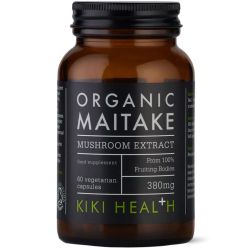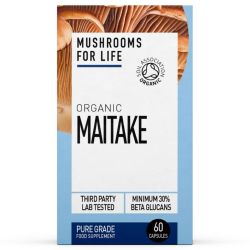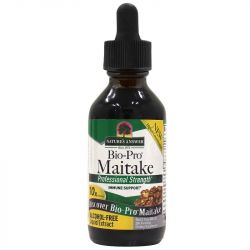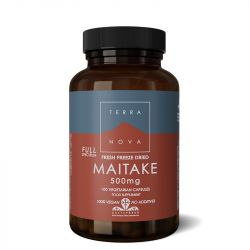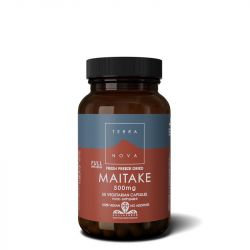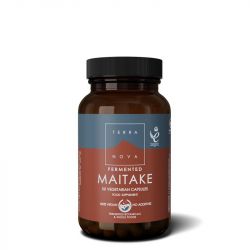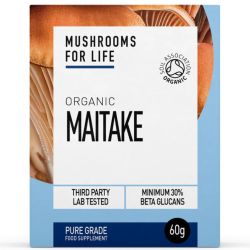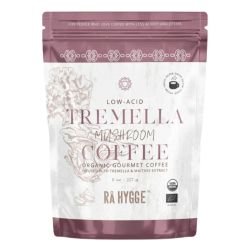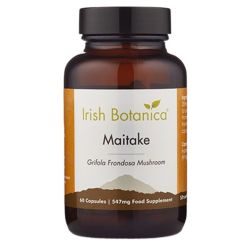Maitake Mushroom Supplements
Maitake mushrooms are commonly found in Asia but also in North America. They have a range of health benefits and are commonly taken in capsule, powder and also coffee form.
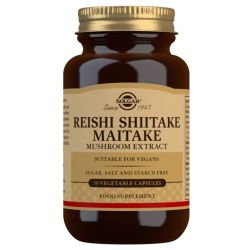 Solgar Reishi Shiitake Maitake Mushroom Extract Vegicaps 50Special Price £25.46 Regular Price £33.95
Solgar Reishi Shiitake Maitake Mushroom Extract Vegicaps 50Special Price £25.46 Regular Price £33.95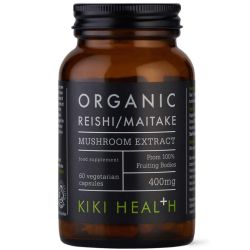 KIKI Health Mushroom Extract Maitake & Reishi Blend Capsules 60Special Price £24.00 Regular Price £30.00
KIKI Health Mushroom Extract Maitake & Reishi Blend Capsules 60Special Price £24.00 Regular Price £30.00
All you need to know about Maitake
What are Maitake Mushrooms?
Maitake mushrooms, scientifically known as Grifola frondosa, are a type of edible fungus native to northeastern Japan but also found in parts of China and North America. They are commonly known as "hen of the woods" due to their frilly, layered appearance, resembling the feathers of a fluffed-up hen.
What do Maitake Mushrooms do?
Maitake mushrooms contain a range of bio-active substances and compounds including:
-
Beta-Glucans: Maitake mushrooms are particularly rich in beta-glucans, which are complex polysaccharides with immune-modulating properties. Beta-glucans have been studied for their potential to enhance immune function, reduce inflammation, and exert antitumor effects.
-
Polysaccharide-Protein Complexes: Maitake mushrooms contain unique polysaccharide-protein complexes, such as the beta-glucan-protein complex D-fraction (or MD-fraction). These complexes are believed to contribute to the mushroom's immunomodulatory and antitumor activities.
-
D-Fraction (MD-Fraction): This specific polysaccharide-protein complex found in Maitake mushrooms has been the subject of research for its potential anticancer effects. It is thought to stimulate various immune cells and inhibit tumor growth.
-
Ergosterol: Maitake mushrooms contain ergosterol, which is a precursor to vitamin D2. Ergosterol has been studied for its potential immunomodulatory and antitumor effects.
-
Amino Acids: Maitake mushrooms are a good source of various amino acids, including essential amino acids. Amino acids are the building blocks of proteins and play essential roles in various physiological processes.
-
Phenolic Compounds: Maitake mushrooms contain phenolic compounds, including flavonoids and phenolic acids, which have antioxidant and anti-inflammatory properties.
-
Vitamins and Minerals: Maitake mushrooms are a source of various vitamins and minerals, including B vitamins (such as riboflavin, niacin, and pantothenic acid), vitamin D (when exposed to sunlight), potassium, magnesium, and selenium. These nutrients contribute to overall health and well-being.
-
Immune Support: Maitake mushrooms contain beta-glucans and other bioactive compounds that have been shown to modulate the immune system. They may help enhance the body's defense mechanisms, making it more effective at fighting off infections and diseases.
-
Antioxidant Properties: Maitake mushrooms contain phenolic compounds and other antioxidants that can help neutralize harmful free radicals in the body. This antioxidant activity may help protect cells from damage and reduce the risk of chronic diseases associated with oxidative stress.
-
Anti-Inflammatory Effects: Some research suggests that Maitake mushrooms may have anti-inflammatory properties, which could help reduce inflammation in the body. Chronic inflammation is linked to various health conditions, including heart disease, diabetes, and autoimmune disorders.
-
Blood Sugar Regulation: Maitake mushrooms may help regulate blood sugar levels by improving insulin sensitivity and glucose metabolism. This could be beneficial for individuals with diabetes or those at risk of developing the condition.
-
Weight Management: Some studies suggest that Maitake mushrooms may help support weight loss and weight management efforts. They may influence factors involved in metabolism and fat storage, although more research is needed in this area.
-
Heart Health: Maitake mushrooms may contribute to heart health by helping to lower cholesterol levels and reduce blood pressure. These effects could help lower the risk of cardiovascular diseases such as heart disease and stroke.
-
Bone Health: Maitake mushrooms contain vitamin D (when exposed to sunlight), which is important for bone health and calcium absorption. Including Maitake mushrooms in the diet may help support overall bone health.
-
Type of Benefits:
- Immune Support: Some people may experience a boost in immune function relatively quickly after incorporating Maitake mushrooms into their diet or supplementation routine. This could manifest as fewer instances of illness or faster recovery times from infections.
- Blood Sugar Regulation: For individuals using Maitake mushrooms to help manage blood sugar levels, it may take several weeks to months to observe significant effects on glucose metabolism and insulin sensitivity.
- Antioxidant Effects: The antioxidant properties of Maitake mushrooms may provide gradual benefits over time, such as reducing oxidative stress and supporting overall health. These effects may become more noticeable with consistent consumption.
-
Consistency and Dosage:
- Consistently consuming Maitake mushrooms over an extended period may lead to more pronounced and sustained effects compared to sporadic use. Additionally, the dosage used may influence the speed and intensity of the benefits experienced.
-
Individual Variability:
- Individual responses to Maitake mushrooms can vary based on factors such as metabolism, genetics, overall health, and the presence of underlying health conditions. Some people may notice improvements sooner than others, while for some, it may take longer to observe any noticeable effects.
-
Form of Consumption:
- Maitake mushrooms can be consumed in various forms, including fresh, dried, or as supplements. The form in which they are consumed may influence how quickly their beneficial compounds are absorbed and utilized by the body.
When is the best time to take Maitake Mushrooms?
The best time to take Maitake mushrooms can depend on various factors, including the intended purpose for use and personal preferences. Here are some considerations to help determine the optimal timing:
-
For General Health Maintenance:
- Maitake mushrooms can be consumed at any time of the day as part of a balanced diet to support overall health and well-being. Many people choose to incorporate them into meals or snacks throughout the day.
-
For Immune Support:
- Maitake mushrooms are often taken to support immune function. In this case, consuming them in the morning or earlier in the day may be beneficial as it allows the body to take advantage of their immune-boosting properties throughout the day.
-
For Blood Sugar Regulation:
- If you're using Maitake mushrooms to help regulate blood sugar levels, consider consuming them with meals or snacks that contain carbohydrates. This can help mitigate spikes in blood sugar and enhance the mushrooms' potential benefits for glucose metabolism.
-
For Weight Management:
- If you're incorporating Maitake mushrooms into your diet to support weight loss or weight management efforts, consuming them before meals may help promote feelings of fullness and satiety, potentially reducing overall calorie intake.
-
For Convenience:
- Choose a time of day that aligns with your schedule and preferences. Some people find it easier to incorporate Maitake mushrooms into their morning routine, while others may prefer to consume them with lunch or dinner.
-
Consistency is Key:
- Regardless of the specific timing, consistency is essential for maximizing the potential benefits of Maitake mushrooms. Aim to include them regularly in your diet or supplementation routine to support long-term health outcomes.
What are the side effects from taking Maitake Mushrooms?
Maitake mushrooms are generally considered safe for most people, and they are well tolerated when consumed as a food or supplement.
That said if you experience any kind of common allergic reaction (e.g. Itchy Skin, Rashes) then you should immediately stop using them.
Can I take Maitake Mushrooms everyday?
Materials Needed:
- Maitake Mushroom Spawn: Obtain Maitake mushroom spawn from a reputable supplier. Spawn can be in the form of grain spawn or sawdust spawn.
- Substrate: Common substrates for growing Maitake mushrooms include hardwood sawdust, wood chips, or a combination of both.
- Growing Containers: Use plastic bags or containers for the substrate, or you can use logs for outdoor cultivation.
- Humidifier or Misting System: Maitake mushrooms require high humidity levels for optimal growth.
- Temperature-Controlled Environment: Maitake mushrooms grow best at temperatures around 55-65°F (13-18°C), so you may need to control the temperature in your growing area.
- Sterile Environment: Maintain cleanliness and sterilize equipment to prevent contamination.
Steps to Grow Maitake Mushrooms:
-
Prepare the Substrate:
- Mix hardwood sawdust with water and any necessary supplements (such as wheat bran or gypsum) to create a substrate that provides nutrients for the mushrooms.
- Sterilize the substrate by heating it in a pressure cooker or autoclave to kill any competing microorganisms.
-
Inoculate the Substrate:
- Once the substrate has cooled, transfer it to growing containers or bags.
- Mix in the Maitake mushroom spawn thoroughly to distribute it evenly throughout the substrate.
-
Incubate the Spawn:
- Place the inoculated substrate in a dark, warm environment (around 70-75°F or 21-24°C) for several weeks to allow the mycelium to colonize the substrate fully. This is known as the spawn run phase.
-
Trigger Fruiting:
- After the mycelium has colonized the substrate, expose it to environmental cues that trigger fruiting. This usually involves reducing the temperature and increasing humidity.
- Maitake mushrooms typically fruit in response to cooler temperatures and increased humidity levels.
-
Maintain Growing Conditions:
- Continue to maintain high humidity levels (above 90%) and provide adequate airflow to prevent contamination and promote healthy mushroom growth.
- Monitor the growing environment and adjust conditions as needed to encourage fruiting.
-
Harvest the Mushrooms:
- Maitake mushrooms will develop as clusters of frilly, layered caps. Harvest them when they are still young and tender for the best flavor and texture.
- Cut the mushrooms at the base of the cluster using a sharp knife or scissors.
Additional Tips:
- Outdoor cultivation: Maitake mushrooms can also be grown outdoors on logs, similar to shiitake mushrooms. Drill holes in the logs, insert spawn, and seal with wax to prevent contamination.
- Patience is key: Growing Maitake mushrooms can take several months from inoculation to harvest, so be patient and monitor the process carefully.

